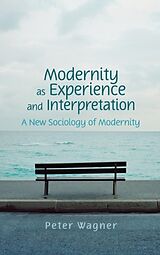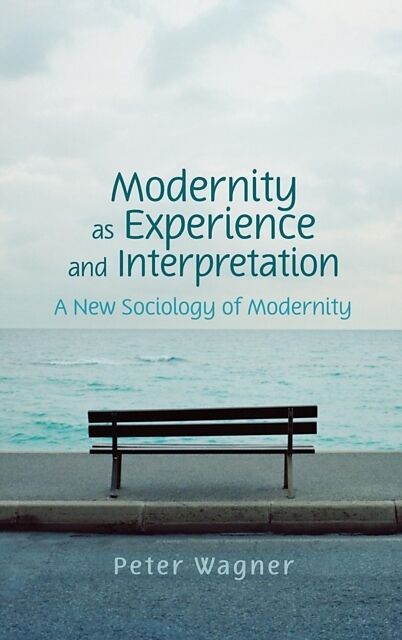Modernity as Experience and Interpretation
Einband:
Fester Einband
EAN:
9780745642185
Untertitel:
Englisch
Genre:
Soziologie
Autor:
Peter Wagner
Herausgeber:
Wiley
Auflage:
1. Auflage
Anzahl Seiten:
296
Erscheinungsdatum:
11.04.2008
ISBN:
978-0-7456-4218-5
Informationen zum Autor Peter Wagner, Professor of Social and Political Theory, European University Institute Klappentext We are all modern today. But modernity today is not what it used to be. Over the past few decades, modernity has been radically changed by globalization, individualization, new inequalities, and fundamentalism. A novel way of analysing contemporary societies is needed. This book proposes such an analysis.Every society seeks answers to certain basic questions: how to order life in common; how to satisfy human needs; how to establish knowledge. Sociology long assumed that the answers had been found once and for all: a liberal-democratic state, a market economy, and free scientific institutions. This trinity used to be called 'modern society'.By contrast, this book is based on the idea that, under conditions of modernity, there are no stable and certain answers to these questions. There is a plurality of possible answers, every proposed answer can be criticized and contested, and every society needs to find its answer on its own.This new sociology of modernity proposes two key instruments through which to understand the answers given to those questions: the experiences human beings have of their own modernity and the interpretations they give to those experiences. It reviews the history of 'Western' modernity in this light and then focuses on the specific answers that were and are being developed in Europe. Zusammenfassung We are all modern today. But modernity today is not what it used to be. Over the past few decades, modernity has been radically changed by globalization, individualization, new inequalities, and fundamentalism. A novel way of analysing contemporary societies is needed. This book proposes such an analysis.Every society seeks answers to certain basic questions: how to order life in common; how to satisfy human needs; how to establish knowledge. Sociology long assumed that the answers had been found once and for all: a liberal-democratic state, a market economy, and free scientific institutions. This trinity used to be called 'modern society'.By contrast, this book is based on the idea that, under conditions of modernity, there are no stable and certain answers to these questions. There is a plurality of possible answers, every proposed answer can be criticized and contested, and every society needs to find its answer on its own.This new sociology of modernity proposes two key instruments through which to understand the answers given to those questions: the experiences human beings have of their own modernity and the interpretations they give to those experiences. It reviews the history of 'Western' modernity in this light and then focuses on the specific answers that were and are being developed in Europe. Inhaltsverzeichnis * Preface* Chapter 1* Ways of understanding modernity* Part I* Interpretations of political modernity: liberty and its discontents* Overture* Multiple interpretations of political modernity* Chapter 2* Modernity and the question of freedom* Chapter 3* The political forms of modernity* Chapter 4* Modernity as a project of emancipation and the possibility of politics* Part II* Interpretations of economic modernity: the endgame and after* Overture* Capitalism and modernity as social formations and as imaginary significations* Chapter 5* The critique of capitalism and its impasse* Chapter 6* Towards a comparative-historical sociology of capitalism* Chapter 7* The exit from organized economic modernity* Part III* Interpretations of epistemic modernity: distance and involvement* Overture* The quest for knowledge beyond experience and interpretation* Chapter 8* The critique of science and its prospects* Chapter 9* Varieties of socio-political interpretations of modernity* Part IV* The European experience and interpretation of modernity* Overture* European integr...
Autorentext
Peter Wagner, Professor of Social and Political Theory, European University Institute
Klappentext
We are all modern today. But modernity today is not what it used to be. Over the past few decades, modernity has been radically changed by globalization, individualization, new inequalities, and fundamentalism. A novel way of analysing contemporary societies is needed. This book proposes such an analysis. Every society seeks answers to certain basic questions: how to order life in common; how to satisfy human needs; how to establish knowledge. Sociology long assumed that the answers had been found once and for all: a liberal-democratic state, a market economy, and free scientific institutions. This trinity used to be called 'modern society'. By contrast, this book is based on the idea that, under conditions of modernity, there are no stable and certain answers to these questions. There is a plurality of possible answers, every proposed answer can be criticized and contested, and every society needs to find its answer on its own. This new sociology of modernity proposes two key instruments through which to understand the answers given to those questions: the experiences human beings have of their own modernity and the interpretations they give to those experiences. It reviews the history of 'Western' modernity in this light and then focuses on the specific answers that were and are being developed in Europe.
Inhalt
* Preface * Chapter 1 * Ways of understanding modernity * Part I * Interpretations of political modernity: liberty and its discontents * Overture * Multiple interpretations of political modernity * Chapter 2 * Modernity and the question of freedom * Chapter 3 * The political forms of modernity * Chapter 4 * Modernity as a project of emancipation and the possibility of politics * Part II * Interpretations of economic modernity: the endgame and after * Overture * Capitalism and modernity as social formations and as imaginary significations * Chapter 5 * The critique of capitalism and its impasse * Chapter 6 * Towards a comparative-historical sociology of capitalism * Chapter 7 * The exit from organized economic modernity * Part III * Interpretations of epistemic modernity: distance and involvement * Overture * The quest for knowledge beyond experience and interpretation * Chapter 8 * The critique of science and its prospects * Chapter 9 * Varieties of socio-political interpretations of modernity * Part IV * The European experience and interpretation of modernity * Overture * European integration as an interpretation of modernity * Chapter 10 * Logics of European history * Chapter 11 * Regionalizing European modernity * Part V * The analysis of modernity and the need for a new sociology * Overture * When the light of the cultural problems has moved on * Chapter 12 * The social theory and political philosophy of modernity * Chapter 13 * The conceptual history and historical sociology of modernity * References

Leider konnten wir für diesen Artikel keine Preise ermitteln ...
billigbuch.ch sucht jetzt für Sie die besten Angebote ...
Die aktuellen Verkaufspreise von 6 Onlineshops werden in Realtime abgefragt.
Sie können das gewünschte Produkt anschliessend direkt beim Anbieter Ihrer Wahl bestellen.
Loading...
Die aktuellen Verkaufspreise von 6 Onlineshops werden in Realtime abgefragt.
Sie können das gewünschte Produkt anschliessend direkt beim Anbieter Ihrer Wahl bestellen.
| # | Onlineshop | Preis CHF | Versand CHF | Total CHF | ||
|---|---|---|---|---|---|---|
| 1 | Seller | 0.00 | 0.00 | 0.00 |
